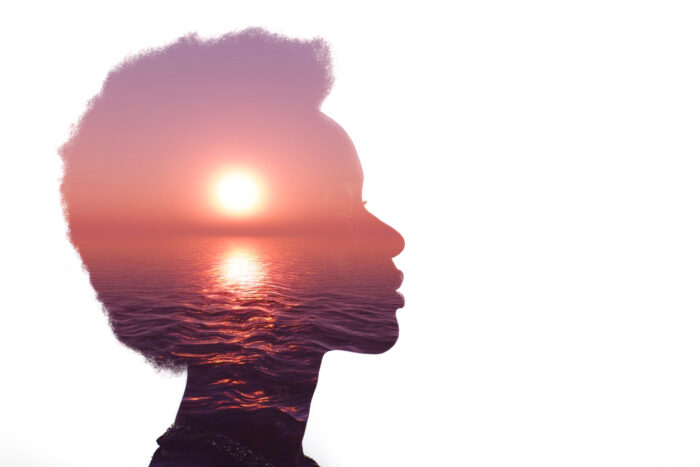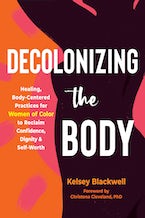By Kelsey Blackwell, author of Decolonizing the Body
*Trigger Warning: This post mentions the embodied impacts of the systemic violence enacted by the colonial project.
We live under systems of oppression established during colonization. For many bodies of color, if we were to trace our lineage, we would see that at some point, our ancestors were colonized.
The reality of what this means is deeply embodied.
Colonization is the ripping of children from mothers; the breaking and whipping of backs; the enslavement of bodies; the raping and murdering of women; the annihilation of entire villages; the decimation of culture, language, and foodways. It is bloodied hands and bruised knees for a religion that espouses intolerance.
Species are lost, lands destroyed, and entire civilizations erased by the greed and hunger for power that fuel colonization.
Colonization and its sister, imperialism, are the “first poisons” from which other ways of dehumanizing and hierarchically valuing bodies finds fertile ground. From this view, it is not only bodies who were violently removed from their land who suffered the impacts of colonization, but also bodies who were stolen, enslaved, and subjugated under colonial values systems.
We know we are a colonized people when we do not speak the native tongue of our lineage; when we do not know our lineage, when we do not know our foods, spiritual practices, rituals, and ceremonies; when the social politics that historically governed our people has been erased or consumed by white value systems. A colonized people are required to adopt the values and traditions of their colonizers to survive. A colonized people do not know where they are from, and question their belonging.
“The Program” is shorthand for the juggernaut that is the colonialist-imperialist-white-supremacist-capitalist patriarchy. Using the term “the program” also conveys that this is a script we’ve learned. The tenets that shape these systems are not innate.
Under the program, we are taught to believe that:
- Power is hierarchical
- Power is a zero-sum game
- The earth’s resources are for the taking
- Nature should remain at the margin
- Whiteness is the standard
- One’s humanity is up for valuation
- Some bodies are disposable
- Individualism wins over the collective
- Interdependence does not exist
- Identity operates on a binary
- Financial wealth reflects human worth
- Happiness comes from material consumption
What else? What other collective beliefs and values are rooted in the program?
Internalizing the Program
Our bodies are shaped by the program. The program would have us believe that we are fundamentally unworthy. We are meant to work harder and harder to be “enough.” We strive to be enough at work, enough for our families, enough for our friends, enough for people we don’t even know, but trust in this “enoughness” remains out of grasp. We doubt our contributions.
When our bodies try to show us something else—sensations that indicate we need rest, for example—we make them the problem. We learn to relate to our bodies as issues to be fixed. And when we simply don’t have time to deal with their aches and pains, we stop feeling altogether.
By internalizing the program, we learn to:
- Disconnect from feeling
- Disconnect from the body
- Operate from the neck up
- Prioritize speed and productivity
- Not need others
- Fear mistakes
- Take on too much responsibility
- Relate to others as competition
- Fear the unknown, and more
Somatics: A Path Toward Decolonization
The path toward healing internalized colonialism requires reconnecting with the parts of ourselves we’ve been trained to dismiss and discount. It requires reconnecting with the knowing of our bodies.
When we intentionally connect with the body, we access a wisdom stream of support that challenges the narrow lens of the program. Our bodies become guides leading us back to a more complete existence.
By engaging in values-aligned, body-centered practices, we gradually unhook from the delusions perpetuated by the program that drive us to try to “earn” our worth. Instead, we begin to embody the truth: we are fundamentally whole and worthy as we are.
Practices that suggest the body as a pathway toward understanding our intrinsic “enough” are called “somatic.” “Soma” is a Greek term that means “the living organism in its wholeness.” The practice of somatics is an integration of all our parts. The soma includes our mind, body, and spirit, and incorporates in our learning how to trust and follow bodily sensations, thinking, feeling, and emotions.
A somatic approach invites us to remember our indigeneity, reclaim our power, release old patterns, and relate to the phenomenal world as interconnected and fundamentally supportive of life. A somatic lens also helps us center practices that prioritize rest, ritual, and community.
A Practice to Begin: Let It Out with a Sigh
Any easy practice that I introduce to all of my clients as a way to begin reconnecting with the body is to simply take a deep breath. This is a practice that we can do anytime.
Here’s how:
Begin by letting yourself feel the points of your body making contact with support. Can you give more of yourself over to that support?
Take a deep breath and let it out with an audible exhale.
Do this three times, seeing if you can extend the length and volume of the sigh each time.
Then, notice.
What are you sensing in your body? Has anything shifted?
The Necessity of Practice
Intentional somatic practice is essential for helping us shift from embodying the values of colonialism that have us forever hustling and trying to prove our worth to reclaiming trust in our inherent “enoughness.” This journey happens with care and patience.
A saying I love in the somatic lineage I teach is, “You are what you practice, and you’re always practicing something.” The question then becomes, is what you’re practicing aligned with what really matters to you?
Kelsey Blackwell is a cultural somatics practitioner and writer dedicated to supporting women of color to trust and follow the guidance of the body so they may powerfully radiate their worth, dignity, and wisdom in a world which sorely needs this brilliance.



 2024 Peace Playbook: 3 Tactics to Avoid Clashes with Your Partner
2024 Peace Playbook: 3 Tactics to Avoid Clashes with Your Partner